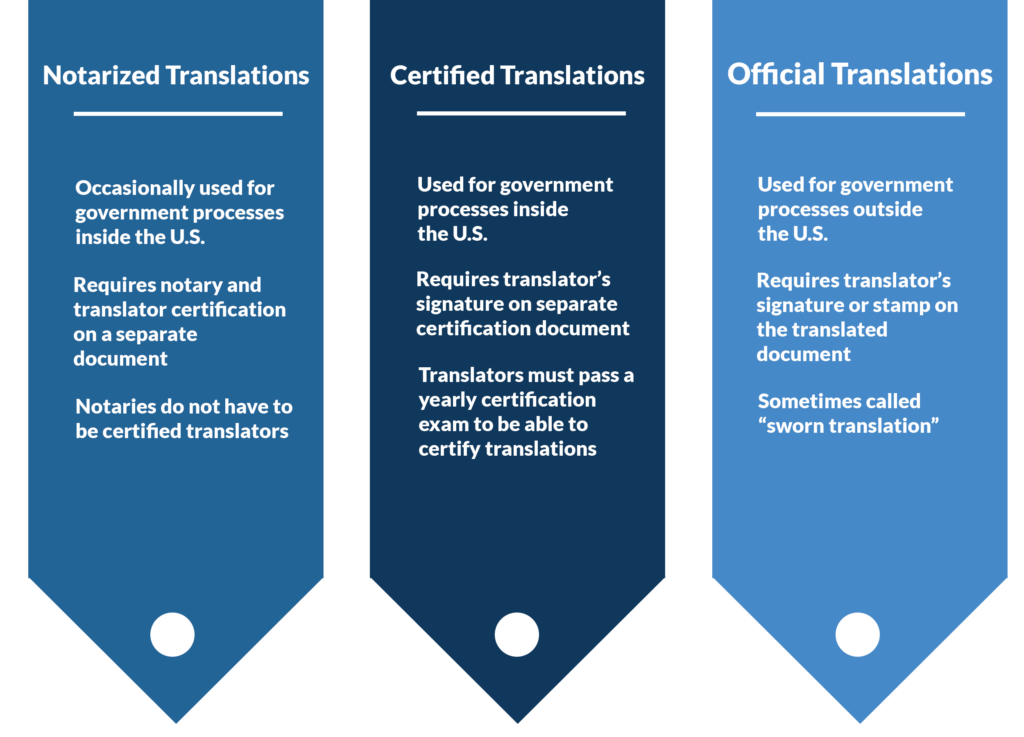Translators always seek to break down linguistic barriers between languages and their speakers to make a text understandable to people from different parts of the world. To study abroad, work in another country, or apply for citizenship with another nation, you’ll need legal documentation. Typically, these documents must be certified, official, or notarized for these government entities to approve them.
But what are their differences between each other? Sometimes, even translation students confuse these three types of services since they are used in the same field and share similarities, but each has its differences and specific uses. To complete your immigration procedures, knowing the differences between these three services is essential.
How to Choose the Correct Translation Service
If you have to submit official paperwork for any process that must be carried out through a government organization and you require the translation of those texts, you must know which service you need so you can get it on time and avoid errors or rejections in your process.
A simple translation is the translation of any physical or digital document without a seal or official validity. This type of translation is usually provided for any kind of translation, like technical, literary, and marketing translation. Simple translations don’t need a certification or seal” from a government organization. Notarized, certified, and official translations, however, are more specialized translations that not just any translator or translation agency can provide.

Official Translation
A sworn translation, also known as an official Translation, is the translation of an official document certified by a wide range of official bodies. Some examples of these documents include birth certificates, certificates of naturalization, court records, and medical documents, among others.
This type of translation is different as it is official and made by a translator endorsed by the Ministry of Foreign Affairs of the corresponding country. This type of translation is required when a document must be presented to an official entity such as the U.S. Embassy or the Mexican Consulate. The title of a sworn translator or expert witness translator gives translators the authority to certify that the translation of a document is authentic and accurate.
If you require this service, consider using a translation agency since they will verify these requirements and choose the perfect translator(s) to do the translation.
Certified Translation
But what is the difference between a sworn translation and a certified translation if both have to do with federal/government certification? Even if it is a tiny difference, it exists.
A certified translation consists of the translation of any document; that is, it doesn’t have to be official or translated by a translator export, but its validity is certified by a translator, a translation agency, or a competent authority. In this document, the translator includes an affidavit that states that the translation is faithful to the original text.
The translator must be a professional who is a member of a relevant body and certified in the language pair you need. Certification is obtained by taking an exam and meeting the requirements requested by that organization. Therefore, you must check if the translator complies with these characteristics when hiring the service.
If you request a certified translation, the translator or translation agency must provide a letter signed by the corresponding translator attesting that the document submitted is true and accurate.
Notarized Translation
You can also ask for a notarized translation if needed. For this service, a professional translator takes an oath before a notary public to ensure the translation is authentic, making them officially responsible in case of any errors. Sometimes, the translator may also sign the certification document before the notary.
The notary public validates the translator’s identity. The translation is delivered with the seal of the notary’s office and a declaration of the professional’s knowledge of the language pair in question. Before hiring this service, it’s important that you investigate if the organism you’re delivering the document accepts notarized translations or not.
Get Started With Your Translation Needs
Now that you know a little bit about each type of translation, you can choose the one that best fits your needs. If you need a notarized, official, or certified translation, Traduality can help! Browse thousands of certified translators, communicate with them directly, and ensure your translations are notarized all in one place. Create your first project today and find vetted translators, or book a meeting with us to learn more about your specific needs to get started!
Updated 2/21/2024.





0 Comments